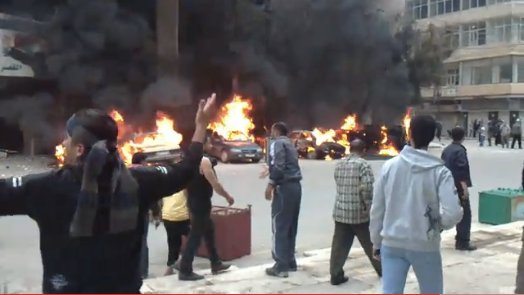Syria has accepted a proposal crafted by Kofi Annan designed to end the bloodshed in the country, the envoy’s spokesman said Tuesday, as opposition factions agreed to join forces against the regime.
UN-Arab League envoy Annan, speaking from Beijing, cautioned that the key to peace was implementing his six-point plan, as monitors reported at least another 31 people killed in Syria on Tuesday.
That brought the total to almost 10,000 in the year-long uprising.
In Istanbul, opposition factions agreed late Tuesday to name the Syrian National Council as their representative and called on President Bashar al-Assad to pull back his tanks to show he was serious about peace.
Annan’s plan includes calls for a daily two-hour humanitarian ceasefire and access to all areas affected by the fighting in Syria.
“The Syrian government has written to the Joint Special Envoy Kofi Annan accepting his six-point plan, endorsed by the United Nations Security Council,” Annan’s spokesman Ahmad Fawzi said in a statement issued in Geneva.
“Mr Annan views this as an important initial step that could bring an end to the violence and the bloodshed, provide aid to the suffering, and create an environment conducive to a political dialogue that would fulfil the legitimate aspirations of the Syrian people,” he said.
Fawzi said Annan had written to Assad asking Damascus for immediate action, including the release of people detained in Syria over the past year.
“Mr Annan has stressed that implementation will be key, not only for the Syrian people, who are caught in the middle of this tragedy, but also for the region and the international community as a whole,” Fawzi said.
US Secretary of State Hillary Clinton said Syria’s reported agreement had to be backed up with action.
“Given Assad’s history of over-promising and under-delivering, that commitment (to Annan) must now be matched by immediate actions,” Clinton told reporters.
“We will judge Assad’s sincerity and seriousness by what he does, not by what he says.”
She vowed to push the Syrian opposition for a clear idea of what they were working for when she attended talks in Turkey this weekend.
“They must come forward with a unified position, a vision, if you will, of the kind of Syria that they are working to build,” Clinton said ahead of Sunday’s Friends of Syria meeting in Istanbul.
They “must be able to clearly demonstrate a commitment to including all Syrians and protecting the rights of all Syrians,” she added.
Sunday’s gathering will bring together Arab countries and Western powers to discuss the crisis.
Syria’s opposition factions took a step towards unity late Tuesday.
“The conference decided that the SNC (Syrian National Council) is the formal interlocutor and formal representative of the Syrian people,” said a statement read to journalists after two days of talks in Istanbul.
Most of the opposition factions present signed the statement except for a few Kurdish factions unhappy at the lack of any reference to a settlement for Kurdish Syrians.
The National Coordination Committee for Democratic Change, which groups Arab nationalist parties, Kurds and socialists, shunned the gathering.
The opposition challenged Assad to prove he was serious about Annan’s plan.
“If he is really serious he must apply this initiative tomorrow,” said opposition leader Waid al-Buni.
“Tomorrow, there must not be any tanks in the streets and the Syrian regime militaries should be withdrawn.
“Tomorrow, the Syrian people must be capable of taking the streets by millions. So tomorrow we will see if the regime is really honest.”
Earlier Tuesday Annan, a former UN secretary general, held talks in Beijing with Chinese Premier Wen Jiabao, who pledged his support for his mediation efforts — as did Russian President Dmitry Medvedev when Annan visited Moscow over the weekend.
China and Russia — both allies of Syria — have provoked Western fury by twice blocking UN Security Council resolutions that condemned Assad’s regime.
Robert Serry, a UN Middle East peace envoy, told a Security Council meeting in New York: “Violence on the ground has continued unabated.
“Credible estimates put the probable death toll since the beginning of the uprising one year ago to more than 9,000. It is urgent to stop the fighting and prevent a further violent escalation of the conflict.”
The United Nations on Tuesday gave an updated toll of “more than 9,000 people” killed, but did not specify if the deaths included soldiers and rebel troops.
The Syrian Observatory for Human Rights, meanwhile, gave a new toll of almost 10,000 people killed in violence linked to the crackdown since March last year.
A total of 9,734 people have died, including 7,056 civilians, the Britain-based monitoring group said.
Syrian forces pressed their assault nationwide on Tuesday, with at least 31 people killed, the Observatory said, adding that 18 were civilians and 13 members of the regular army.
State television reported Assad had inspected troops in the flashpoint Baba Amr neighbourhood of Homs city, site of a fierce battle between regime forces and rebel troops that killed hundreds.
Thirteen of Tuesday’s 18 civilian fatalities died in Homs province, the Observatory said.










